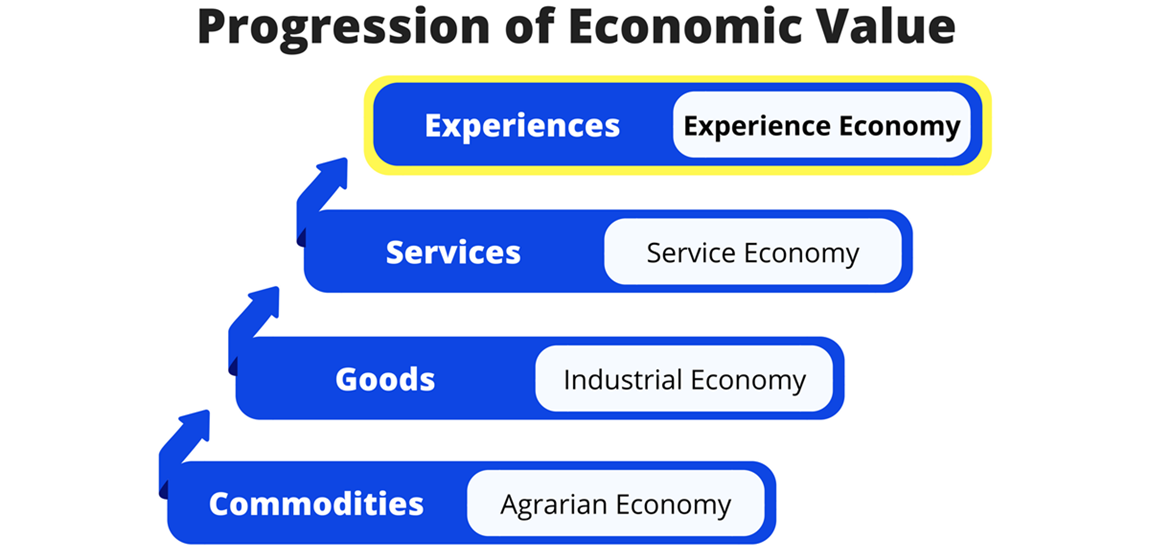The concept of experience economy appeared in 1988 when Pine and Gilmore presented a study to Havard Business Review. They theorized the effects of this concept on businesses, its emergence as an economy after previous agrarian, industrial, and service economies. Companies are moving towards implementing initiatives that enhance customer experience and millenials are on the forefront fueling the experience economy. More details are presented below.

INSIGHTS INTO THE ORIGINS OF THE EXPERIENCE ECONOMY
HOW BRANDS ARE ADAPTING TO THE EXPERIENCE ECONOMY
THE ROLE OF MILLENNIALS AND YOUNGER GENERATIONS

INSIGHTS INTO THE ORIGINS OF THE EXPERIENCE ECONOMY
- The concept of experience economy came to light in 1988 when J. H Gilmore and B. J Pine 2 presented a study to Havard Business review theorizing the term.
- The two academics theorized how the experience economy would influence how businesses conduct business, engage customers, and create their products.
- These two scholars also predicted how the experience economy would emerge after the agrarian, industrial and service economies.
- Pine and Gilmore proposed that brands must orchestrate vividly memorable experiences and how this would become the key product that helps a brand to win and retain clients.
- To bring out the factors that contribute to an experience that is memorable, Pine and Gilmore used four realms namely: educational, entertainment, escapist, and aesthetic.
- When the two academics presented the theory, they talked about outsourcing important experiences like birthdays to Discovery Zone or Chuck. E Cheese where the offer personalized for the individual.
HOW BRANDS ARE ADAPTING TO THE EXPERIENCE ECONOMY
- More than 66% of top marketers in charge of customer experience agree that their companies are actively competing on
customer experience basis and in the next two years, 81% say the competitiveness of their company will be completely based on customer experience. - Chief Marketing Officers (CMO's) are focusing on customer experience and it is also considered among the top three capabilities. Therefore, 18% of their total marketing budget allocation is dedicated to customer experience initiatives.
- Given the heightened focus on customer experience and businesses battling for customer attention, CMO's are dedicating 14.2% of the marketing budget to personalization efforts and strategies.
- In a bid to remain relevant in the Experience Economy,
ThirdLove rolled out a "try before you buy" program that proved vital in enhancingcustomer experience . At least 75% of all new customers acquired byThirdLove came from the program. - Brands are taking moves towards enhancing the entire customer experience chain. According to this survey, businesses are prioritizing initiatives that lead to better customer experience like: improving overall customer journey (46%), cross-channel experiences (45%), and improving content marketing (42%).
THE ROLE OF MILLENNIALS AND YOUNGER GENERATIONS
Millenials form the largest generation in the world and as they get into their prime, they are focused on "doing" rather than "owning". This has led to experiences becoming the most relevant battlefront for brands targetingmillenials .- By 2025,
millenials and younger generations will make up at least 75% of the workforce in the world resultingto a higher spending power. Considering their preference to experiences, it is critical for businesses to connect with this generation that is shaping the experience economy. Millenials expenditure on experiences is four times higher than what they spend on "stuff". This trend is shaping the way companies are handling their clients and prospects since they want to stay relevant in the experience economy.- As
millenials become older and their overall income increase, brands are focusing on providing experiencesto a generation that is fueling the growth of the experience economy.
